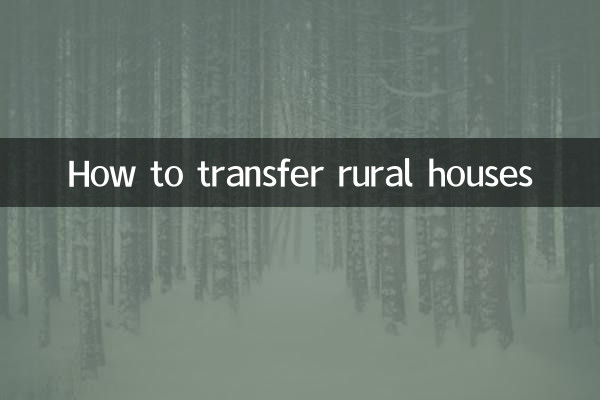How to transfer rural houses: Latest policies and operational guidelines
In recent years, with the adjustment of rural land and real estate policies, rural housing transfer has become the focus of attention of many families. Whether it is inheritance, gift or sale, rural house transfer involves complex legal processes. This article will combine popular topics across the network for the past 10 days to analyze the steps, required materials and precautions for rural house transfer.
1. Common ways to transfer houses in rural areas

Rural house transfer mainly includes the following three methods:
| Transfer method | Applicable scenarios | Key conditions |
|---|---|---|
| Inheritance transfer | After the owner of the house dies, the legal heirs will handle it. | A will or statutory inheritance certificate is required |
| Gift transfer | Free transfer of property between relatives | A gift contract is required and notarized |
| Transfer of transactions | Paid transfer between non-kins | Need to meet the conditions for transfer of homestead land |
2. Specific procedures for rural house transfer
The procedures for different transfer methods are slightly different. The following are the general steps:
| step | Operation content | Things to note |
|---|---|---|
| 1. Prepare the materials | ID card, real estate certificate, homestead use certificate, etc. | Materials require original and copy |
| 2. Sign an agreement | Sell/Gift/Inheritance Agreement | Recommend notarization |
| 3. Pay taxes and fees | Deed tax, stamp duty, etc. | Tax rates vary from place to place |
| 4. Register | Apply to the local real estate registration center | Both parties need to be present |
| 5. Get a new certificate | Get real estate certificate | Usually 5-15 working days |
3. New policy on transferring rural houses in 2023
According to the latest policy adjustments, special attention should be paid to the following content:
| Policies | Specific content | Implementation time |
|---|---|---|
| Homestead qualification rights | The transferee must have a membership of the collective economic organization | Starting from January 2023 |
| Tax and fee discounts | Gifts from immediate family members are exempt from personal income tax | Starting from June 2023 |
| Electronic processing | Some provinces have opened online transfer applications | Gradually implemented |
4. Frequently Asked Questions on Transfer of Rural Houses
1.Q: Can the children of urban household registration inherit rural housing?
A: You can inherit the ownership of the house, but you cannot inherit the right to use the homestead. Houses are not allowed to be rebuilt, and the homestead is collectively taken back after collapse.
2.Q: Does the transfer require the village committee’s approval?
A: Needed. The transfer of the transaction requires the village committee to issue a certificate of agreement to transfer and publicize it for 30 days without objection.
3.Q: How much is the transfer fee?
A: Usually 3-5% of the property's value, including deed tax (1-3%), stamp duty (0.05%), registration fee (80 yuan), etc.
5. Expert advice
1. It is recommended to consult the local real estate registration center in advance for specific policies, and there are special regulations in some areas.
2. If there are multiple children inheritance, it is recommended to notarize property division and notarize in advance to avoid disputes.
3. When transferring the transaction, be sure to verify whether the buyer is qualified to take the contract to prevent the contract from being invalid.
Rural house transfer is of great importance. It is recommended to entrust professional lawyers or real estate agents to assist in the handling to ensure that the process is compliant and rights are guaranteed. With the advancement of the rural revitalization strategy, rural real estate policies may be further adjusted in the future. It is recommended to continue to pay attention to the latest developments.

check the details

check the details